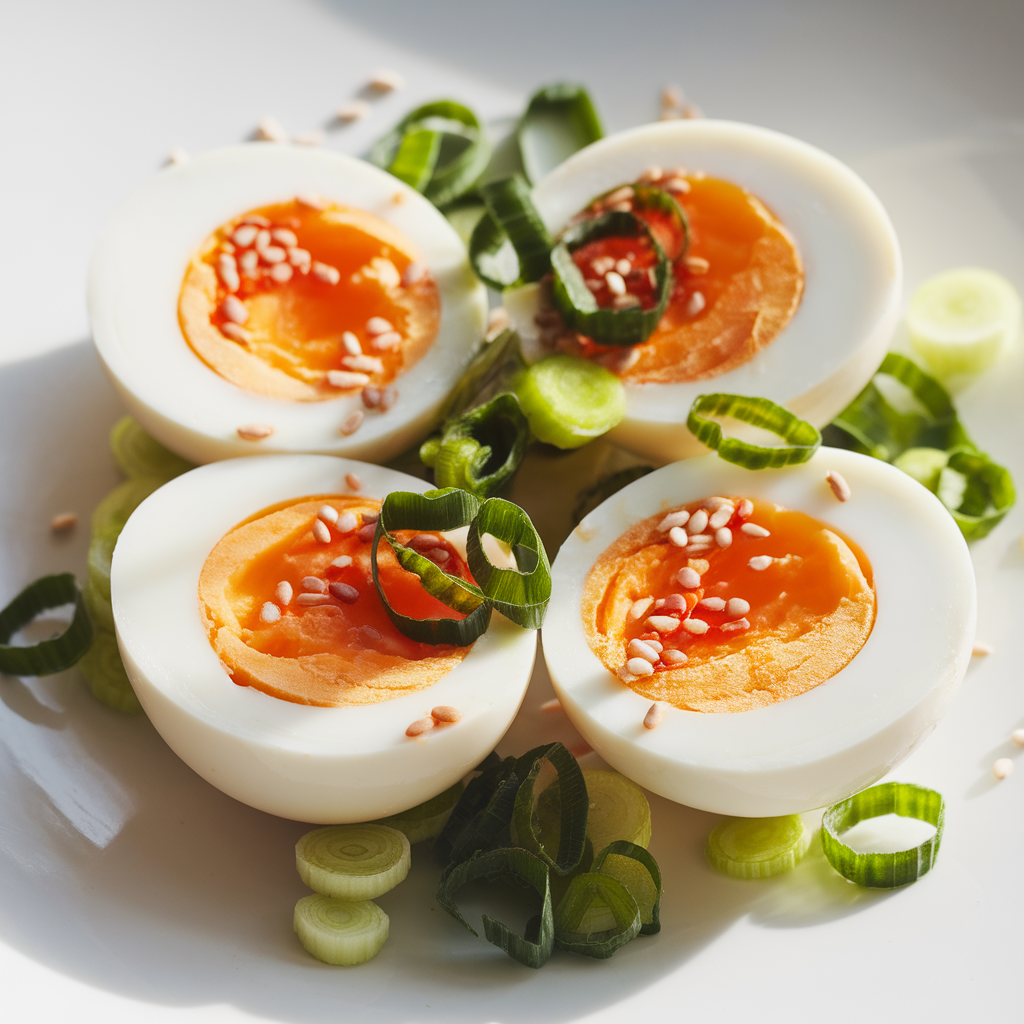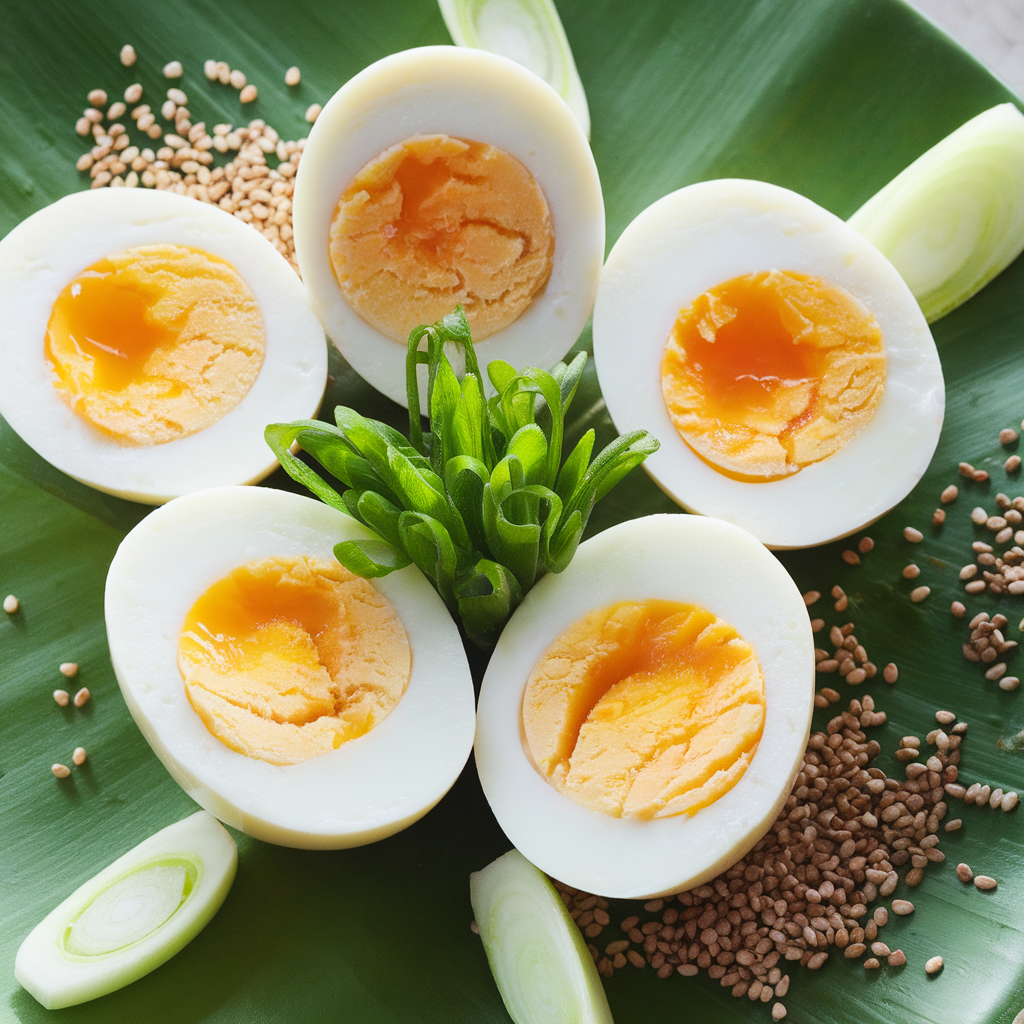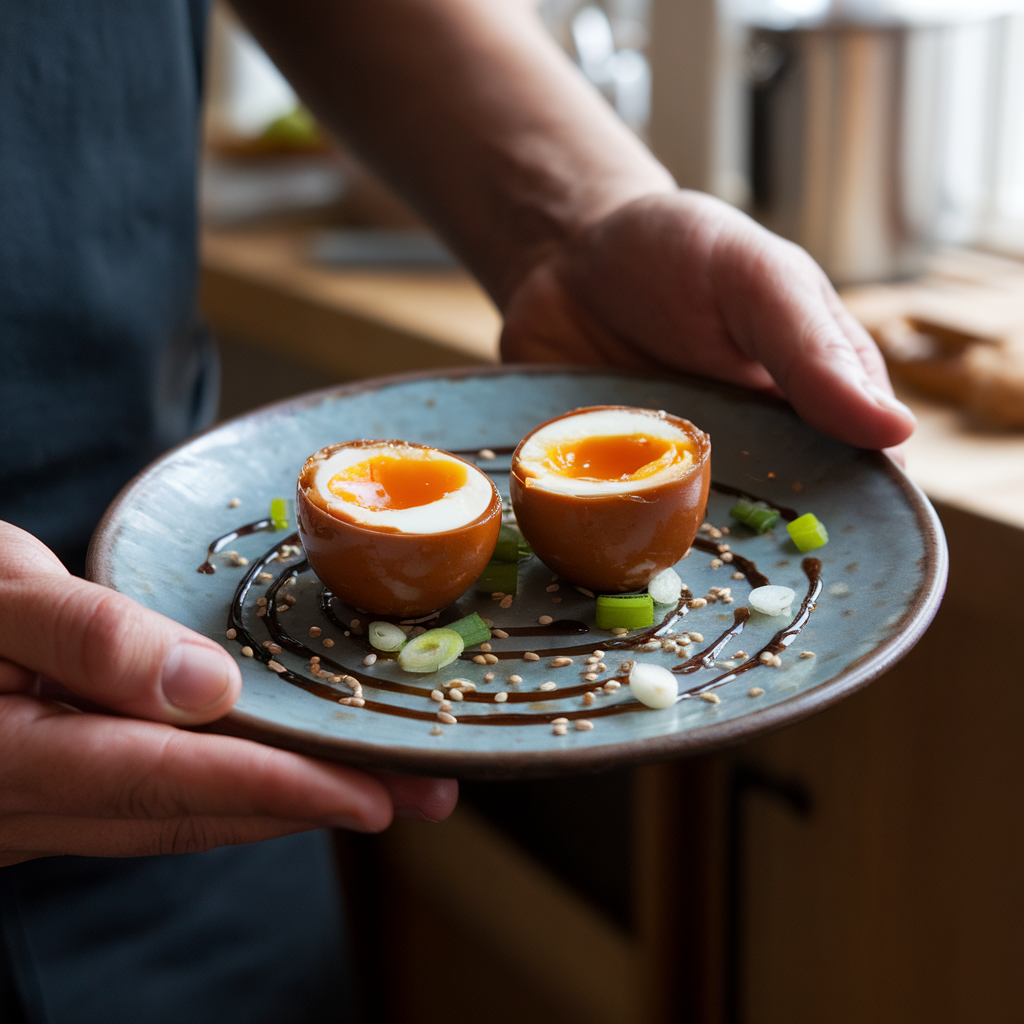
Eggs are among the most versatile ingredients worldwide, and Korean cuisine is no exception. Among many delightful preparations, Mayak Eggs — also known as marinated Korean eggs — have surged in popularity both in Korea and internationally for their addictive flavor and silky texture. If you are a lover of Korean egg recipes soy sauce style, or simply looking to elevate your egg game, Mayak Eggs are a must-try.
In this article, we will explore everything you need to know about Mayak Eggs: the authentic recipe, how to make the perfect soft boiled egg marinade, why these eggs in soy sauce have become a global sensation, and creative ways to enjoy them. Whether you call them the classic drunk eggs recipe, or simply crave a savory, umami-packed snack, this detailed guide on Korean boiled egg recipes will satisfy your cravings.
What Are Mayak Eggs? The Basics of Korean Marinated Eggs
The word Mayak (마약) in Korean means “drug,” but don’t worry — these eggs are not narcotic! The name refers to the addictive taste of these eggs that makes people come back for more. In Korean culture, Mayak Eggs are known as the perfect snack or side dish, packed with flavor and enjoyed for their creamy yolks wrapped in savory soy sauce marinade.
Mayak Eggs are soft boiled eggs marinated in a flavorful sauce mainly consisting of soy sauce, garlic, green onions, and sugar. The eggs soak up the marinade, developing a beautiful dark brown exterior and a rich, complex taste. The yolk remains soft and custardy, offering an incredible contrast of textures with the slightly firm white infused with flavor.
The Charm of Korean Egg Recipes with Soy Sauce
Eggs are a staple in many cuisines, but in Korea, the combination of eggs and soy sauce has created a whole category of beloved dishes. From boiled eggs in sauce like Mayak Eggs to braised soy eggs (Jangjorim), soy sauce adds a deep umami punch that balances the rich egg flavor.
Soy sauce, fermented and packed with glutamates, elevates simple boiled eggs into something extraordinary. When combined with aromatics like garlic and scallions, the result is a harmonious dish that is savory, slightly sweet, and pleasantly salty — a perfect bite every time.
Ingredients for the Perfect Mayak Eggs (Korean Marinated Eggs)
To create authentic Mayak Eggs, gather the following ingredients:
- 6 large eggs (preferably fresh and at room temperature)
- 1/2 cup soy sauce (traditional Korean soy sauce or light soy sauce)
- 1/2 cup water
- 2 tablespoons sugar (white or brown sugar works well)
- 3 cloves garlic, minced
- 2 green onions, chopped (green parts preferred)
- 1 teaspoon sesame oil (adds nutty aroma, optional but recommended)
- 1 teaspoon chili flakes (gochugaru or crushed red pepper, optional for spice)
- 1 teaspoon rice vinegar (optional, for balancing flavor)

Step-by-Step Guide to Making Korean Mayak Eggs Recipe
Step 1: Soft Boil the Eggs
The texture of the egg yolk is essential in making the perfect marinated Korean eggs. The goal is a slightly runny or custard-like yolk paired with fully cooked egg whites.
- Fill a pot with enough water to cover the eggs by at least an inch.
- Bring the water to a gentle boil.
- Using a slotted spoon, carefully lower eggs into the boiling water.
- Boil the eggs for 6 to 7 minutes:
- 6 minutes for a slightly runny yolk
- 7 minutes for a creamier but still soft yolk
- Immediately transfer the eggs to an ice water bath to stop the cooking process and make peeling easier.
- Let eggs cool for 5 to 10 minutes.
Step 2: Prepare the Soy Sauce Marinade
While the eggs cool, make the marinade:
- In a bowl or container, combine soy sauce, water, and sugar. Stir until the sugar dissolves.
- Add the minced garlic, chopped green onions, sesame oil, chili flakes, and rice vinegar.
- Mix well to combine all the flavors.
Step 3: Peel and Marinate the Eggs
- Gently peel the cooled eggs without breaking the whites.
- Place the peeled eggs into the marinade ensuring they are fully submerged. If needed, use a small plate or weight to keep them under the liquid.
- Cover the container and refrigerate for at least 6 hours, but ideally overnight (8-12 hours) for maximum flavor absorption.
Why Are These Called “Drunk Eggs”? The Origin of the Name
The nickname “drunk eggs” comes from the eggs soaking in a soy sauce marinade that acts like a “liquid” making them appear like they are “drunk.” It also refers to how addictive the flavor is, as people find themselves wanting more after the first bite. This is a common playful naming convention in Korean street food culture, reflecting how beloved this simple dish is.
How to Serve Mayak Eggs
Mayak Eggs are extremely versatile and can be enjoyed in many ways:
- Ramen Topping: Slice the eggs in half and add to ramen for that extra creamy richness.
- Bibimbap: Add whole or halved marinated eggs on top of this classic mixed rice bowl.
- Rice Bowls: A simple bowl of steamed rice with a soy sauce egg makes for a comforting meal.
- Salads: Cut and toss into salads for an umami-rich protein boost.
- Snack: Straight from the fridge as a delicious, healthy snack or appetizer.
- Lunchbox: Perfect addition to packed lunches or picnic baskets.

Tips for the Best Korean Mayak Eggs Recipe
- Egg Freshness Matters: Fresh eggs are easier to peel, but if your eggs are too fresh, consider using eggs that are about a week old for easier peeling.
- Timing is Key: Use a timer to get consistent yolk texture.
- Marinate Time: The longer the eggs marinate, the stronger the flavor and darker the exterior. Don’t exceed 24 hours to avoid over-saltiness.
- Soy Sauce Choice: Use quality Korean soy sauce if possible for authentic flavor.
- Customize: Feel free to add ginger slices, star anise, or mirin for different flavor profiles.
- Storage: Store marinated eggs in the refrigerator, covered, and consume within 3-4 days.
Exploring Variations of Korean Boiled Egg Recipes
The beauty of Korean egg recipes soy sauce style is how adaptable they are. Some variations include:
- Spicy Mayak Eggs: Increase chili flakes or add gochujang (Korean chili paste) for heat.
- Sweet Soy Eggs: Use more sugar or add honey for sweetness.
- Herb Infused: Add fresh herbs like cilantro or basil to the marinade.
- Vegan Alternative: Marinate firm tofu slices similarly for a plant-based option.
- Jangjorim Style: Braise eggs longer with beef broth and soy sauce for a fully cooked, meaty flavor.
The Science Behind the Soft Boiled Egg Marinade
The marinade works by allowing salt and aromatics to slowly penetrate the egg whites, flavoring them deeply. The soft yolk remains creamy and is not overly salty, providing a perfect balance.
- Soy Sauce: Rich in glutamates, soy sauce imparts umami, making the eggs savory and complex.
- Sugar: Balances the saltiness and adds a subtle sweetness.
- Garlic and Green Onions: Provide aromatic freshness and depth.
- Sesame Oil: Adds nuttiness and a delicate fragrance.
- Chili Flakes: Introduce a mild heat, enhancing complexity.
The eggs become not just a simple protein source but an explosion of flavors and textures.
Food With Soy Sauce: Beyond Mayak Eggs
Mayak Eggs are part of a larger tradition of food with soy sauce in Korean and East Asian cuisines, including:
- Soy Braised Tofu
- Soy Sauce Chicken
- Soy Marinated Beef (Bulgogi)
- Soy Sauce Pickled Vegetables
Using soy sauce as a marinade or seasoning elevates dishes, delivering bold flavor and enhancing natural ingredients.
Health Benefits of Mayak Eggs (Marinated Korean Eggs)
- Protein-Rich: Eggs provide high-quality protein essential for muscle repair and growth.
- Vitamins & Minerals: Eggs contain vitamin B12, D, selenium, and choline.
- Low-Calorie Flavor Booster: Soy sauce and aromatics add flavor without many calories.
- Antioxidants: Garlic and green onions contribute antioxidants, supporting immune health.
- Satiety: The protein and fat content help keep you full longer.
Frequently Asked Questions About Mayak Eggs
How long do Mayak Eggs last in the fridge?
Marinated eggs are best eaten within 3-4 days when stored in an airtight container in the refrigerator.
Can I make Mayak Eggs without soy sauce?
Soy sauce is essential for the signature flavor. However, you can experiment with tamari (gluten-free alternative) or coconut aminos for different dietary needs.
What’s the difference between Mayak Eggs and soy sauce eggs (Jangjorim)?
Mayak Eggs are soft boiled and marinated briefly, maintaining a soft yolk. Jangjorim eggs are hard-boiled and braised longer in a soy sauce and beef broth mixture, resulting in fully cooked yolks and a different texture.
Can I freeze Mayak Eggs?
It’s not recommended to freeze boiled or marinated eggs as the texture of the yolk and whites changes negatively upon thawing.

How to Reheat Marinated Korean Eggs
Mayak Eggs are typically eaten cold or at room temperature. If preferred warm:
- Place the eggs (whole or halved) in warm water for a few minutes to gently heat without cooking further.
- Avoid microwaving directly to prevent rubbery texture.
Making Your Own Soft Boiled Egg Marinade: Variations and Enhancements
Experimenting with the marinade can create exciting new flavor profiles:
- Add Ginger: Thinly sliced or grated ginger for a zing.
- Mirin or Sweet Rice Wine: For slight sweetness and complexity.
- Citrus Zest: Lemon or yuzu peel for freshness.
- Different Chili Types: Gochugaru, fresh chili slices, or chili oil for heat.
- Herbs: Thai basil, cilantro, or shiso for aromatic complexity.
Mayak Eggs in Popular Korean Dishes
Mayak Eggs aren’t just a snack; they are integral in enhancing several Korean dishes:
- Ramen: The creamy yolk complements the broth perfectly.
- Bibimbap: Adds richness and protein.
- Kimbap: Sliced marinated eggs used inside these Korean sushi rolls.
- Noodle Bowls: Udon or cold noodles topped with halved eggs.
- Rice Bowls: Any steamed rice bowl gains umami depth with a marinated egg.
Cultural Significance of Mayak Eggs
Mayak Eggs have become a beloved staple in Korean households and street food stalls. Their rise in global popularity parallels the worldwide love for Korean cuisine and culture, especially K-dramas and K-pop, where the dish often appears as a comfort food.
Their nickname “drug eggs” reflects the informal and playful nature of Korean culinary naming, highlighting the joy and delight food brings.
Final Words: Why You Should Try This Korean Mayak Eggs Recipe Today
If you want a quick, easy, and unforgettable egg dish, the Korean Mayak Eggs recipe is your answer. Combining simple ingredients with an effective technique, this recipe transforms humble boiled eggs into an addictive delight that can accompany almost any meal.
From the perfectly cooked soft yolk to the richly flavored soy sauce marinade, these eggs encapsulate the essence of Korean comfort food — simple yet deeply satisfying.
Try making these marinated Korean eggs for your next meal, impress your family and friends, and discover why they are a worldwide phenomenon!




